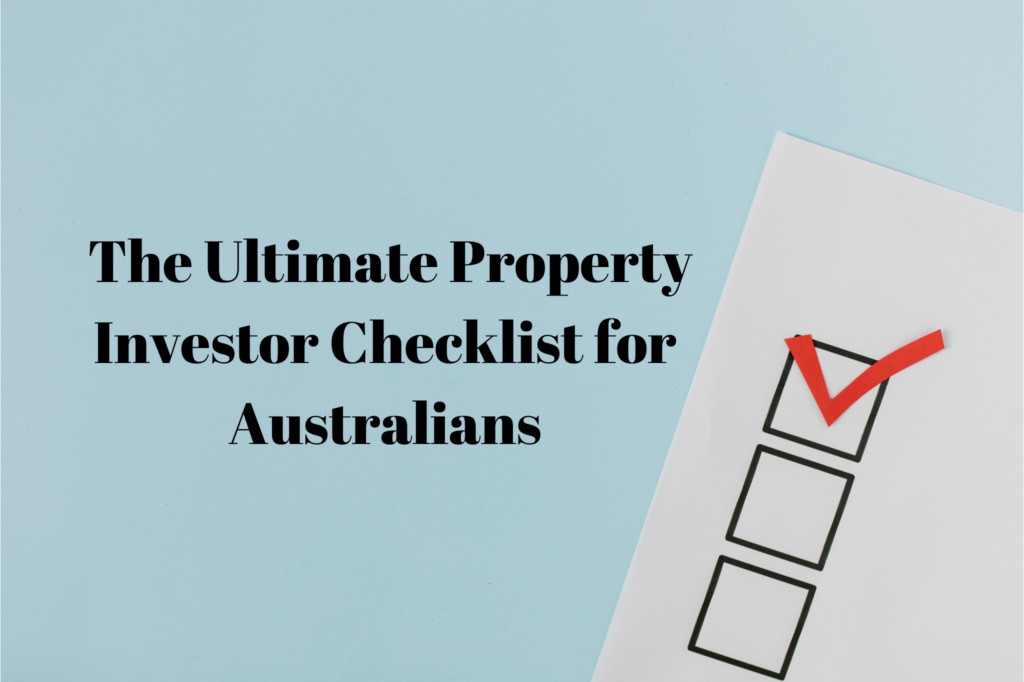Hey there, future property mogul! Are you ready to dive into the exciting world of Australian property investment? Before you start swimming with the sharks, you’ll need a comprehensive checklist to keep you afloat. Think of it as your trusty life jacket, helping you minimize risks and maximize returns. In this article, we’ll guide you through the essential steps to becoming a savvy property investor, from setting your goals to managing your investment like a pro. We’ll also explore some real-life success stories and answer frequently asked questions to help you navigate the sometimes choppy waters of property investment. So, let’s get started on this thrilling journey together!

Setting Your Investment Goals
Defining your short-term and long-term investment goals
First things first, you need to know where you’re headed. It’s like planning a road trip – without a destination in mind, you’ll just be driving around aimlessly. Are you looking for a quick flip to make some fast cash, or are you in it for the long haul, building a rental property empire? Maybe you’re looking to diversify your investment portfolio or save for a comfortable retirement. Whatever your goals, it’s crucial to have a clear picture of what you want to achieve.
Determining your risk tolerance and investment strategy
Once you’ve got your goals sorted, it’s time to determine your risk tolerance and investment strategy. Are you a daredevil who’s willing to take on high-risk, high-reward investments, or are you a cautious captain who prefers a slow and steady approach? Your risk tolerance will play a significant role in shaping your investment strategy, so be honest with yourself.
Establishing a realistic timeline for achieving your goals
Next, establish a realistic timeline for achieving your goals. Property investment is not a get-rich-quick scheme, and it’s essential to have patience and a long-term perspective. Consider factors such as your age, financial situation, and future plans when setting your timeline. Remember, slow and steady wins the race!
Aligning your investment goals with your overall financial plan
Finally, make sure your investment goals align with your overall financial plan. Property investment should be just one piece of the puzzle, working in harmony with your other financial commitments and aspirations. Consult with a financial advisor to ensure your investment strategy fits seamlessly into your broader financial landscape.
Assessing Your Financial Situation

Evaluating your current income, expenses, and savings
Now that you’ve got your goals in place, it’s time to crunch some numbers. Don’t worry, it’s not as scary as it sounds! Start by evaluating your current income, expenses, and savings. This will give you a clear picture of your financial health and help you determine how much you can realistically invest in property.
Determining your borrowing capacity and loan eligibility
Next, determine your borrowing capacity and loan eligibility. This involves evaluating factors such as your credit score, debt-to-income ratio, and employment status. Having a realistic understanding of how much you can borrow is crucial, as it will shape your investment strategy and property search.
This is where the expertise of mortgage brokers, such as those at Pinpoint Finance, becomes invaluable. The brokers at Pinpoint Finance can provide personalised guidance, helping you navigate the complexities of the borrowing process. They can assess your financial situation comprehensively, giving you a clear picture of your loan eligibility and potential borrowing capacity. Their in-depth knowledge of the mortgage market allows them to identify the best loan products suited to your needs, ensuring you make informed decisions that align with your financial goals.
By leveraging the expertise of Pinpoint Finance, you not only gain a better understanding of your borrowing potential but also benefit from tailored advice that can optimise your investment strategy. With their support, you can confidently proceed with your property search, knowing you have a solid financial foundation in place.
Preparing a detailed budget for your investment property
Once you know your borrowing capacity, it’s time to prepare a detailed budget for your investment property. This should include all the costs associated with property investment, such as stamp duty, legal fees, mortgage repayments, insurance, maintenance, and property management fees. Don’t forget to factor in a buffer for unexpected expenses, such as repairs or vacancies.
Considering the costs associated with property investment
It’s also crucial to consider the tax implications of your investment property. In Australia, property investors can benefit from tax deductions such as negative gearing, depreciation, and capital gains tax discounts. However, tax laws can be complex, so it’s essential to consult with a qualified accountant or tax specialist to ensure you’re maximising your tax benefits and staying compliant with regulations.
Researching the Property Market
Identifying potential investment locations and property types
Time to put on your detective hat and dive into market research! Look for areas with strong population growth, infrastructure development, and economic stability. Consider factors such as proximity to transport, schools, and amenities, as these can all impact the desirability of your investment property.
Analysing market trends, demographics, and growth potential
When analysing market trends, demographics, and growth potential, it’s essential to look at both historical data and future projections. Consider factors such as median property prices, rental yields, vacancy rates, and capital growth. Look for areas that have demonstrated consistent growth over time, rather than chasing short-term hotspots.
Understanding local zoning laws and regulations
Don’t forget to brush up on local zoning laws and regulations, as these can have a significant impact on your investment strategy. For example, some areas may have restrictions on the type of properties you can build or the number of tenants you can have. Make sure you understand the local laws and regulations before making any investment decisions.
Keeping up-to-date with industry news and insights
Finally, make sure you keep up-to-date with industry news and insights. Attend property investment seminars, read industry publications, and follow relevant bloggers and podcasts. The more informed you are, the better equipped you’ll be to make smart investment decisions.
Building Your Property Investment Team
Identifying the key professionals needed for successful property investment
No successful investor is an island! You’ll need a team of experts to help you navigate the property market and achieve your investment goals. Start by identifying the key professionals you’ll need on your team, such as a mortgage broker, real estate agent, property manager, accountant, and solicitor.
Selecting a knowledgeable and experienced mortgage broker
When selecting a mortgage broker, look for someone who is experienced in working with property investors and has a deep understanding of the various loan products available. A good mortgage broker will be able to help you find the best loan for your needs and guide you through the application process.
Pinpoint Finance stands out in this regard. With a commitment to delivering exceptional service and tailored financial solutions, Pinpoint Finance prides itself on being a trusted partner for property investors. Their team of experienced mortgage brokers is dedicated to understanding each client’s unique financial situation and investment goals. By offering expert advice and a wide range of loan products, they ensure that clients receive the most suitable options available. Pinpoint Finance’s personalised approach and deep industry knowledge make them an invaluable resource in navigating the complexities of securing a mortgage, ultimately helping clients achieve their property investment aspirations.
Choosing a reliable and reputable real estate agent
When choosing a real estate agent, look for someone who has a proven track record of working with investors and has a deep understanding of the local market. A good agent will be able to help you find the right property, negotiate the best price, and provide valuable insights into the local market.
Engaging with property managers, accountants, and legal experts
A property manager is another essential member of your team, particularly if you’re planning on holding your investment property for the long term. Look for a manager who is experienced in working with investors and has a proven track record of maximising rental returns and minimising vacancies. Don’t forget about the importance of having a good accountant and solicitor on your team, as they can help you navigate the complex world of property tax and legal matters.
Conducting Thorough Due Diligence

Inspecting potential investment properties
Once you’ve found a potential investment property, it’s time to put on your inspector’s hat and conduct some thorough due diligence. This involves evaluating the condition and potential of the property, as well as conducting a comprehensive market analysis.
Evaluating the condition and potential of the property
When inspecting the property, look for any signs of damage or wear and tear that could impact its value or rental potential. Consider factors such as the age of the property, the condition of the appliances and fixtures, and any necessary repairs or renovations.
Particularly, be vigilant for signs of water damage and mould, as these issues can significantly undermine the property’s viability as an investment. Water damage can lead to structural issues and costly repairs, while mould can pose serious health risks to tenants, making the property less attractive and potentially leading to longer vacancy periods. Identifying these problems early on can save you from unexpected expenses and help you avoid investing in a property that may not yield the returns you anticipate.
Conducting a comprehensive market analysis
It’s also essential to conduct a comprehensive market analysis to ensure that the property is priced appropriately and has strong rental demand. Look at comparable properties in the area and consider factors such as vacancy rates, rental yields, and capital growth potential.
Reviewing legal documents and contracts
Finally, make sure you review all legal documents and contracts with a fine-tooth comb. This includes the contract of sale, building reports, and strata reports (if applicable). Don’t be afraid to ask questions or seek legal advice if there’s anything you don’t understand.
Financing Your Investment Property

Exploring different loan options and structures
Now that you’ve found the perfect investment property and conducted your due diligence, it’s time to start thinking about financing. There are several loan options available to property investors in Australia, each with its own pros and cons. Explore different loan options and structures, such as interest-only loans, principal and interest loans, fixed-rate loans, and variable-rate loans.
Securing pre-approval for your investment loan
It’s a good idea to secure pre-approval for your investment loan before you start property hunting. This will give you a clear idea of your borrowing capacity and help you narrow down your search to properties that fit within your budget.
Understanding loan-to-value ratios (LVR) and interest rates
When choosing a loan, it’s important to consider factors such as the interest rate, fees, and loan term. Look for a loan with a competitive interest rate and low fees, and consider whether a fixed or variable rate is right for you. It’s also important to understand the concept of loan-to-value ratio (LVR), which refers to the amount you’re borrowing compared to the value of the property.
Considering the tax implications of your investment
Finally, make sure you consider the tax implications of your investment property. In Australia, property investors can benefit from tax deductions such as negative gearing, depreciation, and capital gains tax discounts. However, tax laws can be complex, so it’s essential to consult with a qualified accountant or tax specialist to ensure you’re maximising your tax benefits and staying compliant with regulations.
Managing Your Investment Property
Deciding between self-management and hiring a property manager
Congratulations, you’re now a property investor! But the work doesn’t stop there. Managing your investment property effectively is crucial to maximising your returns and minimising your stress levels. One of the first decisions you’ll need to make is whether to self-manage your property or hire a property manager. Self-management can be a good option if you have the time, skills, and inclination to handle tasks such as finding tenants, collecting rent, and dealing with maintenance issues. However, if you prefer a more hands-off approach, hiring a property manager can be a wise choice.
Setting realistic rental rates and managing tenant relationships
When setting rental rates, it’s important to strike a balance between maximising your returns and minimising vacancy periods. Look at comparable properties in the area and consider factors such as the condition of the property, the local rental market, and any unique features or amenities that your property offers. It’s also important to have a clear and consistent approach to managing tenant relationships, including setting clear expectations around rent payments, property maintenance, and communication.
Maintaining and upgrading your investment property
Don’t forget about the importance of regularly maintaining and upgrading your investment property. This can help you attract and retain quality tenants, as well as maximise your rental returns and capital growth over time. Consider factors such as the age and condition of the property, as well as any local regulations or building standards that may apply.
If you’re working with a Property Manager, ask them what maintenance needs to be done to ensure you are receiving the best possible rental income for your investment property. A good Property Manager can provide valuable insights into necessary upgrades and routine maintenance that can enhance the property’s appeal and functionality, ultimately contributing to higher rental yields and long-term growth.
Regularly reviewing and adjusting your investment strategy
Finally, make sure you regularly review and adjust your investment strategy as needed. This may involve refinancing your mortgage to take advantage of lower interest rates, making improvements to your property to increase its rental value, or adjusting your rental rates to stay competitive in the local market. By staying proactive and adaptable, you can ensure that your investment property continues to perform well over the long term.
Mitigating Investment Risks
Identifying potential risks associated with property investment
No investment is without risk, and property investment is no exception. It’s important to have a clear understanding of the potential risks associated with property investment, such as market fluctuations, changes to lending policies or interest rates, vacancies or tenant defaults, and unexpected repairs or maintenance issues.
Implementing risk management strategies
To mitigate these risks, it’s important to implement effective risk management strategies. This may include diversifying your investment portfolio across different property types and locations, having adequate insurance coverage, and maintaining a contingency fund for unexpected expenses. It’s also important to have a clear exit strategy in place, so you know when and how to sell or dispose of your investment property if needed.
Diversifying your investment portfolio
Diversification is a key risk management strategy in property investment. By investing in a range of different property types and locations, you can spread your risk and potentially maximise your returns. Consider factors such as capital growth potential, rental demand, and market conditions when building your investment portfolio.
Staying informed about market changes and economic conditions
Finally, make sure you stay informed about market changes and economic conditions that may impact your investment. This may include changes to interest rates, lending policies, or property market trends. By staying informed and proactive, you can make more informed decisions about how to manage your investment over the long term.
Tracking and Evaluating Your Investment Performance
Establishing key performance indicators (KPIs) for your investment
Once you’ve purchased your investment property and have tenants in place, it’s important to regularly track and evaluate your investment performance. Start by establishing key performance indicators (KPIs) for your investment, such as rental yield, occupancy rate, capital growth, and cash flow. By tracking these KPIs over time, you can get a clear picture of how your investment is performing and identify areas for improvement.
Regularly monitoring and reviewing your investment’s performance
Make sure you regularly review your investment strategy and make adjustments as needed. This may involve refinancing your mortgage to take advantage of lower interest rates, making improvements to your property to increase its rental value, or adjusting your rental rates to stay competitive in the local market.
Calculating your return on investment (ROI) and cash flow
When evaluating your investment performance, it’s important to consider both your return on investment (ROI) and your cash flow. ROI measures the profitability of your investment, taking into account both the income you receive and the capital growth of the property. Cash flow, on the other hand, refers to the money coming in and going out of your investment on a regular basis. By monitoring both your ROI and cash flow, you can ensure that your investment is performing as expected and make informed decisions about how to manage it over the long term.
Making informed decisions based on your investment’s performance
Finally, don’t be afraid to seek professional advice when needed. This may include working with a financial advisor, accountant, or property investment specialist to help you make informed decisions about your investment. By surrounding yourself with a team of trusted advisors, you can navigate the complexities of property investment with greater confidence and success.
Case Studies and Success Stories
Real-life examples of successful Australian property investors
While property investment can be challenging at times, there are countless success stories of everyday Australians who have built significant wealth through property. From the couple who started small and gradually built a multi-million dollar portfolio, to the single mother who used property investment to achieve financial freedom, these real-life examples demonstrate the power of property investment to create long-term wealth and security.
Lessons learned and insights gained from experienced investors
By studying the experiences of successful property investors, you can gain valuable insights and lessons to apply to your own investment journey. This may include the importance of setting clear goals, conducting thorough research, and surrounding yourself with a team of trusted professionals. It may also include lessons about the power of persistence, adaptability, and long-term thinking in property investment.
Frequently Asked Questions

Is now a good time to invest in property?
This is a common question among aspiring property investors. The truth is, there’s no one-size-fits-all answer. The right time to invest will depend on a range of factors, including your financial situation, investment goals, and risk tolerance. That being said, there are some general principles to keep in mind, such as focusing on the long-term fundamentals of the market and not getting caught up in short-term fluctuations.
How much money do I need to get started in property investment?
The amount of money you’ll need to get started will depend on a range of factors, including the type of property you’re looking to purchase and your financing options. As a general rule of thumb, you’ll need a deposit of at least 5-20% of the purchase price, plus additional funds for purchasing costs such as stamp duty and legal fees. It’s important to have a clear understanding of your financial situation and borrowing capacity before you start investing.
What are the tax benefits of investing in property?
Property investment can offer a range of tax benefits, including deductions for expenses such as mortgage interest, property management fees, and depreciation. You may also be eligible for capital gains tax discounts if you hold the property for more than 12 months before selling. However, tax laws can be complex, so it’s important to consult with a qualified accountant or tax specialist to ensure you’re maximising your benefits and staying compliant.
How do I choose the right investment property?
Choosing the right investment property involves a range of factors, including location, property type, rental demand, and growth potential. Look for properties in areas with strong economic fundamentals, such as population growth, infrastructure investment, and job creation. Consider the needs and preferences of your target tenant market, and look for properties that offer a balance of rental yield and capital growth potential. Finally, make sure you conduct thorough due diligence on any property before making a purchase, including inspections, market analysis, and legal review.
Addressing common concerns and misconceptions about property investment
There are many common concerns and misconceptions about property investment that can hold people back from getting started. These may include fears about market volatility, concerns about the responsibilities of being a landlord, or misconceptions about the risks and rewards of property investment. By addressing these concerns head-on and providing clear, factual information, you can help aspiring investors feel more confident and empowered to take action.
Providing clear, concise answers to each question
When answering frequently asked questions about property investment, it’s important to provide clear, concise, and actionable information. Avoid using jargon or technical language, and focus on providing practical tips and advice that investors can use to make informed decisions. Use examples and case studies to illustrate your points, and encourage readers to seek professional advice when needed.
Congratulations on making it through the ultimate property investor checklist for Australians! By now, you should have a clear understanding of the key steps and considerations involved in successful property investment, from setting your goals and assessing your finances, to building your team and managing your property effectively.
Remember, property investment is a journey, not a destination. It requires ongoing learning, adaptation, and growth to succeed in the long term. But with the right mindset, strategies, and support, you can achieve your investment goals and build a brighter financial future for yourself and your loved ones.
Use this checklist as a guide and a resource as you navigate the exciting and rewarding world of property investment. Don’t be afraid to ask questions, seek advice, and surround yourself with a team of trusted professionals who can help you make informed decisions and stay on track.
Most importantly, believe in yourself and your ability to succeed as a property investor. With dedication, perseverance, and a willingness to learn and grow, you can overcome any challenge and achieve your dreams of financial freedom and security.
So what are you waiting for? Get out there and start building your property investment portfolio today! The world of wealth and opportunity awaits.
